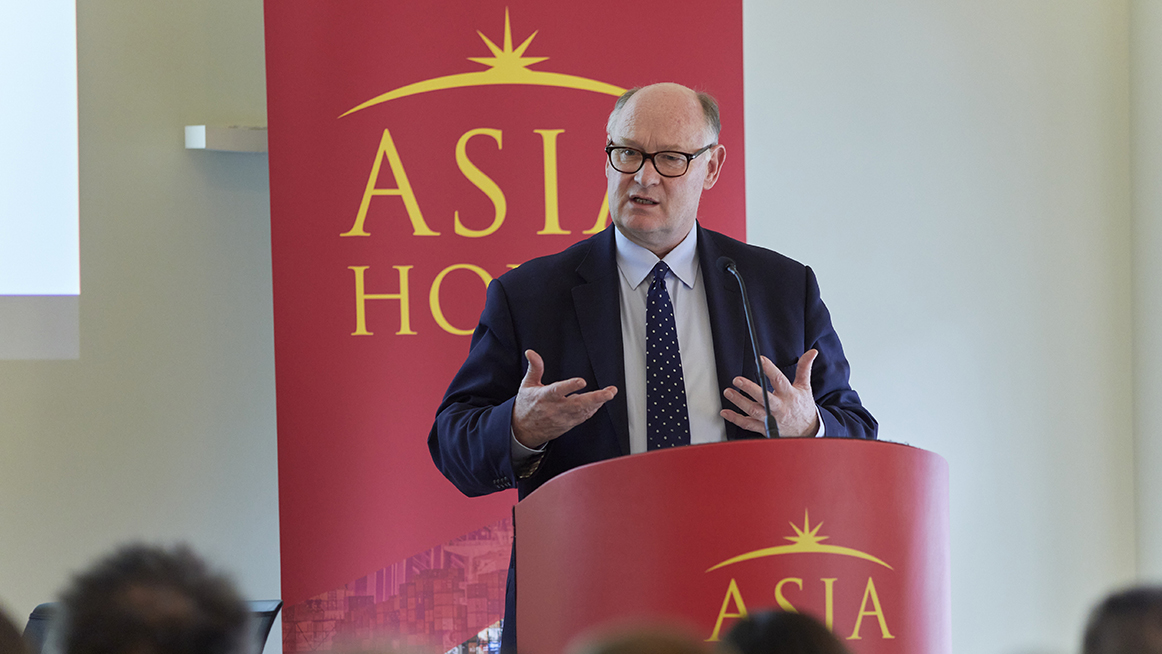Driving commercial and political engagement between Asia, the Middle East and Europe
Driving commercial and political engagement between Asia, the Middle East and Europe
Driving commercial and political engagement between Asia, the Middle East and Europe

The Belt and Road Initiative (BRI) “comes closest to a plan” to help mitigate “existential threats to the developed world,” such as climate change, population growth, and economic inequality, the UK’s Special Envoy to the BRI, Sir Douglas Flint, told Asia House this week.
Speaking to an audience of senior diplomatic and business leaders, Sir Douglas said the world “needs an extraordinary programme of infrastructure development to build an economic ecosystem across the developing world.”
The BRI could help alleviate the pressures that come with climate change, he said, including migration on a scale “that the world is not prepared for.”
In a keynote speech at Asia House’s conference on the UK’s Belt and Road strategy after Brexit, held in partnership with the University of Nottingham, Sir Douglas outlined how the BRI can play an important role in meeting global infrastructure needs, but also highlighted the UK’s role in helping to “build capacity” and strengthen worldwide support for the initiative.
“Our relationship with China on BRI will be constructive and supportive where appropriate, and challenging when necessary,” he said.
“China, I believe, recognises that gaining international financial support for BRI is dependent upon confidence around the integrities, sustainability and economic validation of individual projects,” he said, adding, that Beijing “recognises the City of London’s role can be hugely valuable and influential” in the BRI.
The UK’s possible role could be in defining financial standards, viability proofs, risk mitigations, transparency in governmental criteria, dispute resolution procedures, and the legal underpinnings for BRI investments, he suggested.
However, the most important UK role will be providing information about both the risk and rewards of the BRI, he said, as he warned that support for the initiative will not come without first addressing negative sentiments.
Due to the “the extraordinary scale of the BRI’s ambition” and China’s emergence as the second largest economy worldwide, several concerns have arisen about the country’s leading role in the infrastructure initiative.
There are “concerns about interconnected infrastructure in a technology driven future and the debt burden impact of BRI recipient countries with regard to how the BRI will build China’s international influence,” Sir Douglas said. The legal protection of investors, corruption and environmental standards are also considered issues.
“Addressing these concerns and bringing a better understanding is also part of the role we can play in the UK in getting people to understand the facts and make their own minds up, as opposed to reading the confirmation bias that may complicate that understanding.”
Sir Douglas highlighted the need for “transparency and greater international participation” in future BRI projects to combat fears, and added that China is making a coordinated effort to address most of these concerns.
In regard to green initiatives, he argued that there are always “trade-offs between economic growth, social progress, and environmental protection.”
“If we seek to criticise BRI projects or indeed any infrastructure projects for not being as green as they could be, then there is the point that they are often a great deal greener than they might have otherwise been,” he said.
Looking ahead, there is reason for optimism, according to Sir Douglas. The UK-China relationship, in regard to the BRI, holds a lot of potential for the UK post-Brexit.
The UK has an “important soft power role” in facilitating the shaping of the BRI for worldwide benefits, he said. This is a “role we should grasp with enthusiasm”.
Sir Douglas was speaking at the Asia House conference: ‘The UK’s Belt and Road Strategy After Brexit’, held in partnership with the University of Nottingham. The speech was followed by a panel discussion with Dame Mary Marsh, University of Nottingham; Stephen King, Senior Economic Advisor, HSBC; Ma Hui, Minister, Chinese Embassy in the UK; and Dr Ben Barton, University of Nottingham Malaysia.
